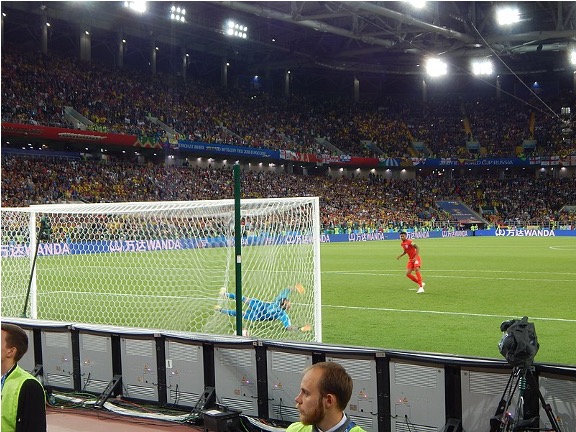Racists Running Amok – But Football Will Fight Back

Image: Hayden Schiff via Wikimedia Commons
Rhys Wallis discusses the recent scrutiny on racist abuse in football, and what needs to change.
Racism and abuse is, unfortunately, nothing new in football, but this summer saw it well and truly rear its ugly head once more. After a year and a bit with no fans in stadia across Europe, recent instances of abuse have left a few wondering if we want fans back in the stadium, or at least back online, where most of this occurs from behind the anonymity of a keyboard.
When Bukayo Saka made his first appearance for England in a major tournament last summer, he was hailed as a breath of fresh air, lifting the side alongside Jack Grealish to earn his place in the XI for the rest of the tournament. By the time he’d had his decisive penalty saved in the final of Euro 2020, however, the torrent of vitriol and abuse was overwhelming, from all sections of ‘fans’ online, and some in the stadium too. The same can be said for Marcus Rashford: quasi-deified for his actions on free school meals over the lockdown period, and on form for England through the tournament. By the time he’d shot his penalty wide, the floodgates of racism and personal attacks were well and truly open.
How those same England fans who had chanted their names from the stands could turn and hurl abuse from the safety of Twitter over a genuine error was baffling.
This has always been the way of the ‘fan’ – not a supporter, not even a true fan, a ‘fan’. They will act as though the player for whom they cheer is the greatest in the history of the world, they will build them up and up and up until the highs are so high that without those rose-tinted lenses they are unattainable. Then there will be an occurrence – most likely a mistake. That mistake wipes the rose tint straight off of the glasses so fast that those ‘fans’ don’t know what hit them, and they lash out. I am trying to see what they see, so that we can learn why they are wrong, and what we as a society can do to temper their expectations, and catch these people before they rush headlong into ruining someone else’s life, and then, by default, theirs.
I have been to football matches where I have thought that a player did not play well. I have been to matches where I have felt angry at a player’s performance. These multi-million pound players, on wages higher than even our accumulated student loans, who suddenly turn into a player of my calibre when in front of goal – yeah, I’ve been angry at that. I can safely say though, that even at the depths of anger with a player, I have never, and as long as I am in control of my mental faculties will never resort to such ugly vitriol and degrading, abusive comments, be they in person or on social media.

Image: Oleg Bkhambri via Wikimedia Commons
So what makes these people turn to racism? To abuse so vile I won’t even quote it here? Here is where my attempt to partially understand these idiots runs out of road. I don’t know. I don’t want to know, in a way, because that means that I think like them, at least in part. I also do want to know why they resort to this – so that I can try to coach people out of it (naïve, I know, but it is the aim) – but I cannot. It is despicable, and it is wrong, but it is part of football until we can do what the campaign asks us to, and kick it out.
From the moment the first racists chanted in the stands, no matter to whom it was offensive, we had this problem. From the moment that those who used to chant in the stands with their face on display migrated to the anonymity of Twitter (for the most part), then we have had this problem. Until we can find a way to remove those parasitic, and deeply backwards thinking fans from football – then we will have this problem.
Forcing users to submit proof of ID to social media companies to create an account is certainly one way to stop racist abuse online. Ideas similar to this though have been met with resistance, especially those who favour anonymity on the internet in general. Recently, players who publicly expose racist messages have caused more scrutiny on the situation, but its difficult to say whether real change has occurred. And in stadiums, more and more players are speaking up about overheard chants, which in turn have been found on match footage or consequent police investigations.
After yet another high-profile reminder of racism in football, it seems as though more is being done to crack down on this abuse. The conversation has started, and the change will follow soon.


